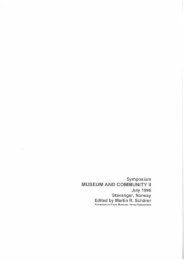Key Concepts of Museology - ICOM
Key Concepts of Museology - ICOM
Key Concepts of Museology - ICOM
Create successful ePaper yourself
Turn your PDF publications into a flip-book with our unique Google optimized e-Paper software.
32<br />
is a theoretical and methodological<br />
framework at the service <strong>of</strong> educational<br />
activities in a museum environment,<br />
activities the main purpose <strong>of</strong><br />
which is to impart knowledge (information,<br />
skills and attitudes) to the<br />
visitor” (Allard and Boucher, 1998).<br />
Learning is defi ned as “an act <strong>of</strong> perception,<br />
interaction and assimilation<br />
<strong>of</strong> an object by an individual”, which<br />
leads to an “acquisition <strong>of</strong> knowledge<br />
or the development <strong>of</strong> skills or attitudes”<br />
(Allard and Boucher, 1998).<br />
Learning relates to the individual<br />
way in which a visitor assimilates the<br />
subject. With regard to the science <strong>of</strong><br />
education or intellectual training, if<br />
pedagogy refers more to childhood<br />
and is part <strong>of</strong> upbringing, the notion<br />
<strong>of</strong> didactic is considered as the theory<br />
<strong>of</strong> dissemination <strong>of</strong> knowledge, the<br />
way to present knowledge to an<br />
individual whatever his or her age.<br />
Education is wider, and aims at the<br />
autonomy <strong>of</strong> the individual.<br />
We can mention other related<br />
concepts which shade and enrich<br />
these different approaches. The<br />
concepts <strong>of</strong> museum activities or<br />
cultural action, like that <strong>of</strong> interpretation<br />
or mediation, are <strong>of</strong>ten invoked<br />
to describe the work carried out with<br />
the public in the museum’s efforts<br />
at transmission. “I am teaching you”<br />
says a teacher, “I am allowing you to<br />
know” says a mediator (Caillet and<br />
Lehalle, 1995) (see Mediation). This<br />
distinction aims to refl ect the difference<br />
between the act <strong>of</strong> training,<br />
and a process <strong>of</strong> awareness appealing<br />
to an individual who will fi nish<br />
the work according to the extent<br />
to which he assimilates the content<br />
before him. Training assumes<br />
constraint and obligation, whereas<br />
the museum context supposes freedom<br />
(Schouten, 1987). In Germany<br />
the term pedagogy, or Pädagogik is<br />
used more frequently, and <strong>of</strong> the<br />
word used to describe education<br />
within museums is Museumspädagogik.<br />
This refers to all the activities<br />
that a museum may <strong>of</strong>fer, regardless<br />
<strong>of</strong> the age, education or social background<br />
<strong>of</strong> the public concerned.<br />
DERIVATIVES: ADULT EDUCATION, EDUCATIONAL<br />
SCIENCES, EDUCATIONAL SERVICES, LIFE-LONG<br />
EDUCATION, INFORMAL OR NON-FORMAL EDUCATION,<br />
MID-CAREER EDUCATION, MUSEUM EDUCATION, POPULAR<br />
EDUCATION.<br />
CORRELATED: AWAKENING, CULTURAL ACTION,<br />
CULTURAL ACTIVITIES, DEVELOPMENT, DIDACTIC,<br />
INTERNSHIP, INSTRUCTION, MEDIATION, PEDAGOGY,<br />
TEACHING, TRAINING, TRANSMISSION, UPBRINGING.<br />
ETHICS<br />
n. (From the Greek ethos: customs, character)<br />
– Equivalent French: éthique; Spanish:<br />
etica; German: Ethik; Italian: ethica; Portuguese:<br />
ética.<br />
Generally speaking, ethics are a philosophical<br />
discipline in philosophy<br />
that deals with identifying values<br />
which will guide both private and<br />
public human conduct. Far from<br />
being a simple synonym <strong>of</strong> morality,<br />
as is currently believed, ethics is the<br />
opposite in so far as the choice <strong>of</strong><br />
values is not imposed by a specifi c<br />
set <strong>of</strong> rules, but rather freely chosen<br />
by the individual taking action. This
















